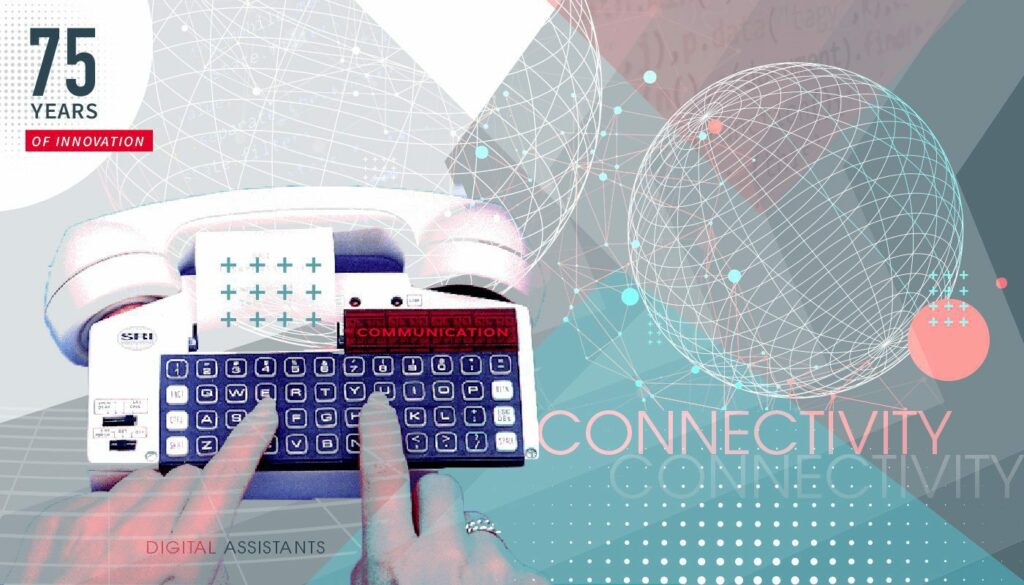
Establishing clearer connections between humans and digital technology
“To get to the next level of augmentation, computers need to be able to handle conversation. A few systems can do that in specialized areas but this is just the beginning of what is likely to become a fundamental mechanism for human-computer interaction.”
— William Mark, President, Information and Computing Sciences, SRI International
Human beings are social creatures. We love to communicate and connect. Recent developments in digital communication have taken us into forms of communication and connection that sci-fi writers could only dream of in the mid-twentieth century. SRI International takes dreams and turns them into reality, with communication and connectivity as a particular focus. Here are some of the past, present and future endeavors of the teams working on AI-enabled digital assistants and the associated areas of connectivity and communication.
The past as a foundation for future developments
The connectivity that we take for granted today had help along the way from the talented people at SRI. ARPANET, developed in the 1960s, was a vision of a connected computing and communication system across geographies. This vision became a reality through a consortium in which SRI played a key role. ARPANET was the nascent internet, the beginning of our connected world and a foundation for work to come in the areas of communication, connectivity and digital assistants.
Digital Assistants (Siri)
SRI birthed one of the most famous of all AI-enabled systems, Siri. Embedded in Apple iPhones since 2010, Siri’s development was based on advances in speech and natural language understanding.
CALO — artificial intelligence and machine learning
Before Siri, there was the Cognitive Assistant that Learns and Organizes (CALO) project. A long-time goal of Artifical Intelligence is a digital assistant that learns what its users need and and acts as their partner in performing tasks. In 2003, SRI began work on CALO as part of the Personal Assistant that Learns (PAL) program which was created by the Defense Advanced Research Projects Agency (DARPA). In contrast to prior efforts to build digital assistants, CALO was rooted in the concept of learning “in the wild”, namely employing machine learning to create its models for how to act rather than having them explicitly programmed.
OAA (Open Agent Architecture)
Digital assistants and AI agents need a dedicated framework designed to support their operations. In the 1990s, SRI developed the Open Agent Architecture (OAA®) to provide a computer programming methodology for software agents. As the world of computing became ever more distributed and connected, OAA enabled software agents to leverage rich data formats such as multimedia, audio, and video.
Into the future
SRI researchers continue to expand the boundaries of artificial intelligence and human-centered computer interaction, pioneering new technical approaches and creating new spinoff companies.
Digital Specialists
Siri and other popular digital assistants are generalists, providing a natural way for users to search the Internet and perform simple commands. They do not have in-depth knowledge in specific areas and are not able to help users perform complex tasks. SRI researchers have been working to create the technology for digital specialists: digital assistants that have enough knowledge of a specific area to help users efficiently handle real-world tasks. For example, SRI Venture’s spin-out, Kasisto, provides an AI platform for finance industry virtual assistants that embody enough knowledge of banking to help customers perform a wide variety of banking tasks completely online without human intervention.
Conversations with AI
Conversation is a key human mechanism for socializing and collaborating. Current digital assistants, useful as they are for single-shot interactions, are not able to handle real conversation. SRI researchers are exploring conversational intelligence in order to implement enough of the mechanisms of human conversation in digital assistants to give them the ability to converse with us. The conversational capability that is so natural for us is actually quite complex. In human conversation, we give each other spoken and visual cues to cooperatively determine who should continue speaking, when to respond/interrupt, etc. — all of this while maintaining context within multiple related threads. By understanding how natural conversations work, researchers are expanding the capabilities of digital assistants to become true conversational partners.
Introspective AI and explainability
Introspective AI is an exciting — and very necessary — new area that SRI is currently exploring. The goal is to provide mechanisms that enable AI systems to understand their limits and explain their findings to human operators. This is particularly difficult for the latest generation of large-scale data-driven AI systems. These systems build highly complex models of the world based on the data they are trained on. Understanding the generalizations embodied in these models and recognizing their limits is critical to safe deployment in domains where mistakes can have significant repercussions. “Explainability” is vital to future deployments, allowing humans to understand the rationale for AI-based decisions. This rationale is used for decision validation or to ensure that the system is not exhibiting any forms of bias.
SRI researchers believe that a comprehensive, multi-disciplinary approach will be required to achieve explainability. An article from SRI states, “Creating computer systems that we can trust requires advances in a number of computer science disciplines ranging from system design to knowledge representation. Whatever is going on inside of the systems, we will need time and experience to learn how far to trust them.”
Deep fake detection
AI can also have a dark side. One area with potential for nefarious use of AI is the “deep fake”; these are AI-enhanced videos that can make subjects appear to say almost anything. Advances in AI technology have enabled deep fake videos that are almost indiscernible from reality. Fortunately, AI techniques can also be used to detect deep fakes. SRI is working on leading-edge techniques in deep fake detection, where the system looks to identify subtle inconsistencies between a video and its accompanying audio.
Deep learning and DASL
Deep learning has the power to unlock hidden insights within data. However, deep learning systems require large amounts of training data. Even if sufficient data is available, the training of models can be time-consuming and expensive. One way to reduce the amount of necessary data is to incorporate knowledge from human experts. SRI is developing a framework that supports this combination of learning from data with human expertise called Deep Adaptive Semantic Logic (DASL). DASL is based on a hybrid AI model that truly embeds human knowledge into the machine. SRI’s work to date has shown that this method can reduce data requirements by several orders of magnitude without sacrificing accuracy. Furthermore, it provides the means for humans to direct learning towards desired solutions and supports explainability. Applications include medical diagnosis, integrated circuit testing and molecular design.
SRI International continues to work to deliver world-class technologies in the areas of communication, connectivity, and digital assistants.
Resources
Digital Assistants (Siri): https://medium.com/dish/75-years-of-innovation-siri-75244a25c741
OAA: https://medium.com/dish/75-years-of-innovation-open-agent-architecture-software-oaa-112c14ce2730
ARPANET https://medium.com/dish/75-years-of-innovation-arpanet-4c23a0162d25
Deep Knowledge and the Rise of Virtual Specialists: https://www.sri.com/blog-archive/deep-knowledge-and-the-rise-of-virtual-specialists/
DASL: http://dasl.sri.com/dasl-machine-learning-small-data?hs_preview=yjfLmzsZ-48284860015
Deep Fakes: https://www.sri.com/case-studies/spotting-audio-visual-inconsistencies/



